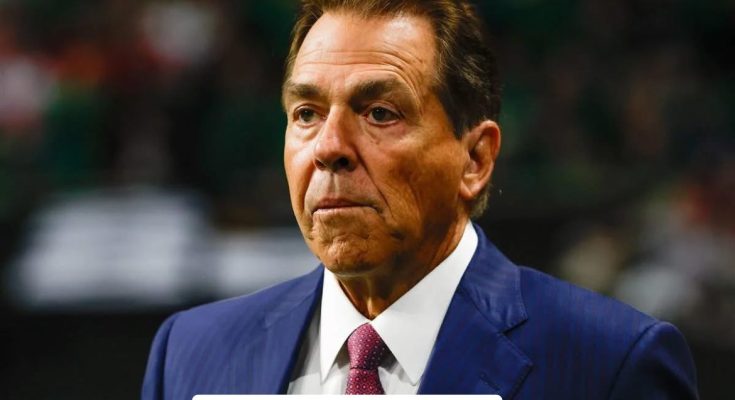Nick Saban has never been one to mince words when it comes to discussing the performance of his teams, and once again, his recent appearance on the Pat McAfee Show gave fans and analysts plenty to dissect. Reflecting on Alabama’s clash with Florida State, Saban remarked that “the whole psychological disposition of Alabama’s team changed after the opening drive.” He openly admitted that he wasn’t sure exactly why this happened, raising questions about whether it was anxiety, expectation, or something else entirely that shifted the momentum of the game. For a coach as meticulous and detail-oriented as Saban, those words carry weight, because they suggest that what went wrong may not have been physical execution or scheme, but rather a mental and emotional state that altered the Crimson Tide’s ability to compete at the level they are accustomed to.
This observation has stirred debate, because Alabama under Nick Saban has become synonymous with mental toughness, preparation, and the ability to adapt to adversity. Rarely have fans seen an Alabama team rattled so early in a game, especially after an opening drive. Typically, that’s when Alabama seizes control, imposing their will and forcing opponents into catch-up mode. To hear Saban himself acknowledge that something shifted psychologically right after that moment signals that Florida State may have done something to expose a deeper issue—one that might not just be about football, but about expectations, pressure, and mindset.
Florida State came into the game with plenty to prove. They were motivated, disciplined, and highly physical, which clearly made an impression on Alabama’s sideline. An opening drive can often set the tone for a game, but for Saban to suggest it completely altered the team’s disposition implies that his players may have been carrying a weight of pressure before kickoff even happened. Alabama has long lived under the microscope, with the college football world constantly evaluating whether the Tide are still the gold standard of the sport. Every snap they take is analyzed, every performance critiqued, and every stumble magnified. For young players who grow up idolizing Alabama’s program, stepping into that pressure cooker can create enormous internal tension. Perhaps the anxiety of having to live up to both the Alabama legacy and the expectation of their fans began to creep in.
Saban’s rhetorical questions—“Was it anxiety? Was it expectation?”—highlight the fine line college athletes walk when competing on the biggest stages. Anxiety can manifest in hesitation, self-doubt, or overthinking. Expectation, on the other hand, can weigh players down, making them feel as though they are playing not just for themselves but to uphold the standard of an entire institution. When those two factors collide, it can change body language, energy, and confidence in a heartbeat. For Alabama, that shift after the opening drive became apparent, and it’s something even Saban couldn’t fully explain. For a coach who often prides himself on having answers, that honesty is both refreshing and concerning.
The broader implication of Saban’s comments is that football is never just about X’s and O’s. It’s not always the scheme, the play-calling, or the athleticism. Sometimes, it’s about the mental game, and when one team gains that psychological edge, it can snowball quickly. Florida State not only executed well but also may have managed to break Alabama’s rhythm before it even got started. Confidence is everything in sports, and when it slips away early, regaining it can be one of the toughest challenges for even the most talented teams.
Fans of Alabama will no doubt be dissecting this comment, because it raises questions about the identity of this year’s Crimson Tide squad. Are they mentally tough enough to withstand adversity? Can they shake off moments of doubt and reassert themselves as the dominant force they’ve been for over a decade? Or is there a generational shift happening, where players raised in the era of NIL deals, constant social media attention, and heightened individual visibility are more vulnerable to pressure than past groups? These are uncomfortable but necessary questions, and Saban’s willingness to acknowledge them publicly suggests he knows they must be addressed moving forward.
At the same time, credit has to be given to Florida State. Too often, when Alabama struggles, the narrative centers on what Alabama did wrong rather than what the opponent did right. Florida State’s ability to put the Tide in that psychological hole so quickly is a testament to their preparation, confidence, and resilience. They were not intimidated by Alabama’s aura, and they showed that by punching first and forcing Alabama to play from behind mentally. That’s no small feat, and it demonstrates that the Seminoles have the kind of program maturity and belief in themselves to stand toe-to-toe with one of the giants of college football.
Saban’s reflection also speaks to the broader truth of why college football is so compelling. Unlike professional athletes, who have years of experience handling pressure and adversity, college players are often 18-to-22-year-olds learning how to manage those same challenges for the first time. The stakes are enormous, and the pressure of national television, massive fan bases, and expectations of perfection can be overwhelming. Alabama has been so dominant for so long that fans often forget these are still young men navigating all the complexities of performance anxiety, self-belief, and external scrutiny. A single drive can feel like the world is crumbling if it doesn’t go according to plan.
One of the reasons Nick Saban has been so successful is because he has mastered the art of keeping his players focused on “the process” rather than outcomes. He preaches about preparation, discipline, and doing your job on every play. Yet even with that mindset drilled into them, sometimes human nature takes over. A poor start can shake even the most prepared athletes, especially when the weight of expectation makes them feel like one mistake means the end of everything they’ve worked for. This is what makes Saban’s comment so fascinating—it reveals that even within his system, psychology remains a variable that cannot always be controlled.
The real question moving forward is how Alabama will respond to this admission. Will the players take it as a challenge to toughen up mentally and prove that they can bounce back when adversity strikes? Will the coaching staff adjust their approach, spending more time addressing the mental aspects of the game to prevent another collapse in disposition? Or will this become a defining characteristic of the season, a lingering vulnerability that opponents will try to exploit by hitting hard and fast in the opening moments of every game?
For Alabama fans, this is a moment of reckoning. For years, the Crimson Tide were viewed as nearly invincible, capable of crushing opponents both physically and psychologically. Now, after Saban himself has acknowledged that psychology played a role in their struggles, the mystique has been cracked open a bit. That doesn’t mean Alabama is done, far from it, but it does mean that the rest of the season will be a test not just of talent, but of resilience, adaptability, and mental toughness.
It is also worth noting that Saban’s transparency is part of his brilliance as a coach. By speaking candidly about the psychological shift, he takes the first step in addressing it. Great leaders don’t hide from problems; they bring them into the open so they can be solved. His players now know that their coach saw the same thing they felt, and that creates an opportunity for growth. Instead of pretending it didn’t happen, Alabama can use this as motivation to ensure it doesn’t happen again.
For the wider college football landscape, Saban’s comments should serve as a reminder that even the greatest programs are vulnerable to the mental side of the game. This is what makes sports beautiful and unpredictable. No matter how talented a team is, no matter how many championships they’ve won, if the psychological balance tips in the wrong direction, it can undo everything. Florida State capitalized on that truth, and now Alabama must regroup and rediscover the mental edge that made them champions for so long.
Fans, analysts, and rivals will continue to debate what Saban meant and how it will shape Alabama’s future, but one thing is clear: the coach’s words have added another layer of intrigue to this season. Every game from here on out will be scrutinized for signs of whether Alabama has corrected the psychological fragility or whether it remains an Achilles’ heel. For a program built on toughness, consistency, and focus, the stakes could not be higher.
This conversation is not just for coaches and players but for fans as well. Do you think Saban is right about the psychological shift, or was it simply Florida State being the better team that day? Was it anxiety, expectation, or maybe even overconfidence that caused Alabama to falter? How do you think the Tide will respond moving forward, and what does this say about the evolving nature of college football? Share your thoughts, your critiques, and your perspectives, because this is a dialogue that goes beyond one game—it’s about the essence of what makes athletes tick under pressure and how great programs adapt when their aura of invincibility is challenged.



